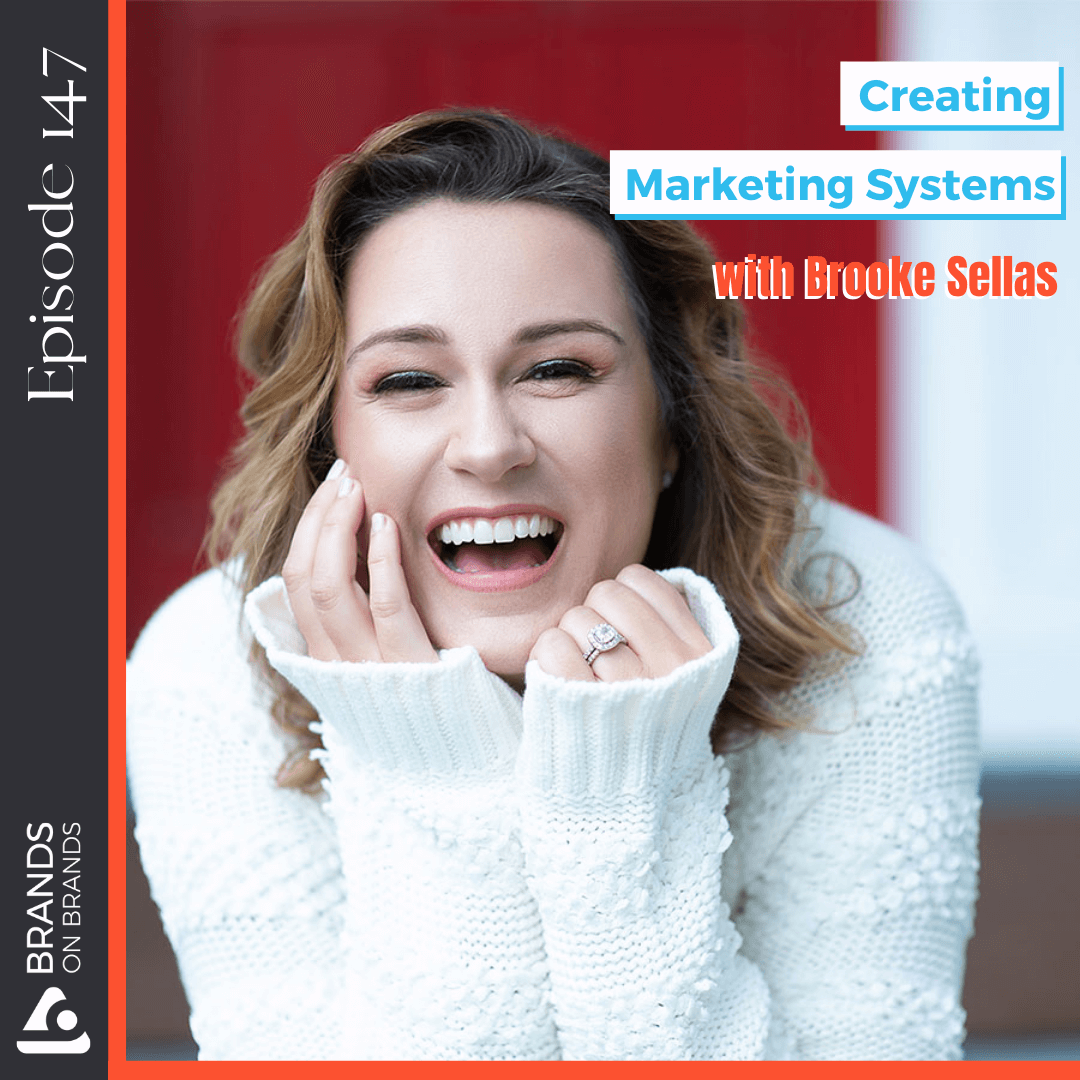In this episode, I talk with Brooke Sellas about the marketing systems she and her team use to help their clients. She also explains how to carve out your niche on the web.
Brooke is the founder and CEO of digital marketing agency B Squared Media. If you find you’re running into a brick wall with your company’s social media or advertising strategy, B Squared is happy to take the wheel with their team of experts. Brooke also co-hosts the podcast Marketing Companion with Mark Schaefer, which covers a wide and informative variety of topics in the marketing world.
WHY YOU NEED MARKETING SYSTEMS
Brandon Birkmeyer: [00:07:30] What I’m excited to talk to you about are marketing systems. Can you give us a little introduction into what marketing systems are and why they’re important for entrepreneurs to implement in their business?
Brooke Sellas: [00:08:47] We really look at systems in two different ways. One is obviously the systems, the software that you have to use to complete the job. We use a few core tools to help us get that done.
SOFTWARE AND SOPs
The other side of the system is our SOP, our Standard Operating Procedures. What we’d done, and what I did as an entrepreneur early on in my first two and a half years was just me working seven days a week. As I started to realize that I was going to have to bring on more help, I had to create these systems (or checklists or punch lists, whatever you want to call them.)
I had to make sure that the way that we were doing work for clients was repeatable and that someone else could do it, which means that it also had to be transferable.
I had to really think about how to simplify the process and put it down in something that was transferable and repeatable by anyone who had the special set of skills that are necessary to do social work.
MARKETING SYSTEMS HELP WITH CONSISTENCY
Brandon Birkmeyer: [00:09:45] I think one of the things that I hear most from entrepreneurs is finding the time to do something like marketing is hard. “How can I be consistent? I know I should be on Facebook and everyone should be creating content on Instagram, but I don’t know how to do it consistently.”
I think one of the things that they miss along the way is the system side of it. If you have to help an entrepreneur getting started, what are a couple of systems and some of the first things that can help them get moving along with this and make it a little less daunting?
ASK QUESTIONS AND LISTEN
A lot of that actually starts with listening. What we want to find out is, who is our audience? What channels are they using? What are they talking about when it comes to our industry, our brand, or products or services?

After that, I think the second biggest thing is about content. What content do we already have that meets some of those needs and interests that the audience is talking about or looking for?
If we don’t have that content, how can we create it? How can we be smart about creating it?
How can we create a piece of content like a swipe file or an ebook or something that’s long-form content, take that central idea or piece of content and break it out into manageable chunks through video or through snackable bites for social media, quotes, or stats, whatever it may be?
MARKETING SYSTEMS ENCOURAGES CREATION
Essentially you want to work smarter and not harder with your content. You’re creating these more in-depth pieces. Then all of that work that goes into it actually helps you create more content down the road so you’re not constantly having to create content over and over and over again.
I think another great place to look to as well would be your frequently asked questions. Almost every company has frequently asked questions. I would say my best piece of advice like that is uber-arching for this whole conversation is to document everything.
If you already haven’t started documenting your frequently asked questions, start doing that. As you get a list of those questions, that’s a ton of golden content. That is what people want to know you’re giving them. You’re giving the audience what they’re asking for time and time again.
It helps with SEO and Google search. Once you have that content living on your website, it helps with your social content. It helps with your advertising. It really does start to build into all kinds of different places that will help you as a business.
TEMPLATE IDEAS FOR MARKETING SYSTEMS
Brandon Birkmeyer: [00:14:19] Listen to your competitors and what their customers are asking. If you can solve a problem that your competitors aren’t solving, there you go. You have A) some more content to create, but also B) you might be solving a problem that brings customers to you from them.
We can talk about some of the tools too. I think templates and processes are amazing and maybe we can call out a couple of them, some templates in general. What are some of the topics?
KNOW WHO YOUR CLIENTS ARE
Brooke Sellas: [00:14:56] For us, we took a two-pronged approach to writing up a template. We knew that we were going to be talking to agency owners because our audience is made up of some agency owners who are similar to us. Then we were also going to be talking to brands and businesses like our clients who we serve.

The list does focus mostly on social media processes, how to get started listening and finding your audience, building brand personas how to find content through that content audit, then also how to create content and put it to a calendar.
Then on the agency side, we talk about things like how to onboard your first client. What are some of the things that you need to do every time for every client? Again, for myself, what I found was this is something that needed to be the same with every client. It needed to be transferable and repeatable in those simple steps.
TEMPLATES CREATE CONSISTENT WORK
Brandon Birkmeyer: [00:15:50] That’s useful because you need to understand yourself and your inputs that you’re going to be giving to anyone you work with, even if you’re not an agency owner. The first question that anyone in marketing is going to ask you is about you and your business, your objectives, your goals, what you’re trying to accomplish, what assets you have, and what you want.
If you download a template like that to get you through it, it helps you focus. It helps you be consistent when you have a problem with consistency. It’s not because you’re not on every day. It’s more about the consistency of the message. It is important that you are coming from a place where you know who you are.
A template like that I’d say is super valuable, whether you’re hiring someone or not, to know who you are and get through that process, that clarity.
MARKETING SYSTEMS GENERATE PRODUCTIVITY
Brooke Sellas: [00:16:45] Yeah. As a business owner to other entrepreneurs who may be listening, I think this is important because what we’ve seen over time is that when we bring on a new person to the team, it takes them a lot longer to get through these processes.
However, because we have these processes built out, over time what we’re seeing is it takes less and less time for them to manage their projects, which means we collect more margin.
Even though it may take you more time to build these out and think about them, (and obviously iterations are constantly being made to make them better, more modern, keeping up with what we’re doing) as an entrepreneur, anytime you can save time and save money, that’s a golden ticket for a win. I would say that the processes really help us with margin as well.
MARKETING SYSTEMS TOOL IDEAS
Brandon Birkmeyer: [00:17:28] What are some of the tools here that make all this easier? I think that’s something that also is a part of this systems conversation.
Brooke Sellas: [00:17:44] Definitely. I’ll start from the outside in. I am the entire sales team for Bsquared Media. For me, it starts with the networking or social stacking as we talked about in the beginning.
I use Nimble CRM, which is a CRM focused on social selling. What I love about Nimble is it operates like any other CRM. There’s a way to keep manage your contacts. There is messaging through email. You can connect to your G Suite or to your Office 365. We use Office 365, so it makes it kind of seamless.

However, what I really love about it is there’s this Nimble plugin, where I can go to Brandon’s LinkedIn page and hit that little Nimble plugin. It starts to build a smart profile for you and your business. Then inside of Nimble, any emails that I send you or messaging that I send out either through Office 365 or inside of the Nimble software, obviously gets relayed to your contact information.
It’s constantly living there, which means as a salesperson, I always know where we left off.
FIND LITTLE THINGS THAT SPECIFICALLY HELP
Additionally, my favorite part of Nimble I think is that I have the ability to both star people, (meaning make them important so that they stay on top of mind) but I also have a little clock where I could hit next to your name, Brandon, this little clock. I could say, “Make sure that I keep in touch with Brandon once a year, once a quarter or once a month, once a week.”
This allows me to stay top of mind with people like Mark Schaefer, who are instrumental to sending us business but also to keep in touch with those people who I have in my peripheral for possibly becoming a client at some point in time.
You can also import Twitter lists, so from Social Media Marketing World, you can take that Twitter list of speakers that they put out, import that list to Nimble, tag them all with the Social Media Marketing World, and then you could send them the messaging, “Hey, I’d love to buy you a beer.”
Then again, you can track your results to see what comes through that kind of tagging. For me as a salesperson, it’s invaluable.
Brandon Birkmeyer: [00:19:45] I think the idea of connecting your marketing and your sales team together is useful overall. We actually had John Ferrara, the founder of Nimble, on the show.
There are a lot of options out there, depending on how much you need to do, what the price points are and what your investment level is there.
DON’T LET MARKETING SYSTEMS TAKE AWAY THE HUMAN EXPERIENCE
What I like is not only do you have something that you can use to inform your sales teams, to give them the information they need, but then you also have things that help you with the outbound messaging.
It helps you to set up your sequences and communication because not everyone has gotten to that point where they say, “Okay, when someone takes this action on my website or this action interacting with one of my messages that’s out there in the market, what do I do next? What’s the sequence of messaging that introduces them to me, or it gets them ready to jump on a phone call?”

This is where you build those things. You start by getting a system to do this. You’re not doing this all by hand. That’s why marketing takes so long a lot of the time because you’re doing all this by hand, one by one.
I appreciate one by one. I love human connection, having a conversation, having a one-on-one email. If you can translate that connection into something that you’re doing automatically, suddenly marketing is easier.
Brooke Sellas: [00:21:18] Yes. That’s another thing that I’ve built up for myself. Again, it’s just me, but I have those templates built out. Of course, I add in the personal touches and messaging and whatnot.
RELATED: Build your personal brand with the Content Marketing Starter Guide.
BUILD YOUR MARKETING SLOWLY
Brandon Birkmeyer: [00:21:29] The bonus is that you get the stats. You get the information that helps you become a better marketer. I think that’s what people don’t understand. Marketing doesn’t work right away. Marketing is going to stink right at the beginning.
You build your systems and you realize, oh, this is what’s working. This is what isn’t. I’m going to continue to make these a little bit more effective, 1% at a time if you will.
Brooke Sellas: [00:21:59] Exactly, and once we bring people in, we do a similar thing. We use a tool called Basecamp for project management. We use Basecamp 3, which has a feature called Client Side. Essentially what happens here is all of our clients live in a project inside of Basecamp. We put all of our team members into that base camp, and we also invite the client if they would like to add to that basecamp.
FIND MARKETING SYSTEMS THAT BUILD YOUR VALUE
That not only cuts down on the back and forth emails with the client, but it really allows them to start to understand the value behind what we do. I think there’s a lot of education still needed around social media management, advertising management, paid media, things like that.
When they get back there and they see all of these processes and to-do lists that we’re checking off on a daily, weekly, and monthly basis, it really starts to help them understand the value behind what we do. I think it helps them really stick with us because they see how organized we are. They see how much work we’re putting into these campaigns or whatever that we’re running for them and they start to appreciate and value what we do.
It’s not expensive. I’m from a nonprofit background, so I’m a penny pincher. It’s another tool that doesn’t cost me a lot but provides so much value to me and my team and our clients.
TOOLS HELP YOU STAY ORGANIZED
Brandon Birkmeyer: [00:23:51] What I like about these tools is it starts as a place where you can save your files. If you write down your checklist of things to do, you can save them. They’re in a place that then when you hire someone else to do it, they can look at the systems you’ve built so you don’t have to keep teaching people how to do things over and over.

If you haven’t figured that out, you need to start writing these things down or filming them and videoing your process for doing things. Start there, make sure that you have a system that you can record and repeat. once you take care of that, if you have employee turnover, you don’t have to keep educating on how to do it.
This is where people save that stuff. It’s not just on a drive somewhere and on Google, (people use that too) but what’s different about it is you save your files there and then you can start assigning people tasks.
You bring in different people’s contact information and you assign them to projects. You can work in a collective space together. It’s like a virtual office, essentially.
MARKETING SYSTEMS MAKE YOUR JOB POSSIBLE
Brooke Sellas: [00:24:45] It’s integral to everything that we do. We couldn’t do our jobs without it. That’s truly how I feel.
Then from the doing work side, the tools that are integral for us in our success would be Sprout Social. We use Sprout Social for both social media management and scheduling.
It’s a dashboard where I could take all of the client’s accounts, whether they’re on Twitter or Facebook, Instagram, or LinkedIn, bring those accounts into the dashboard on Sprout under a client folder, and then manage those accounts through Sprout Social in one place.
They have scheduling so when we create that content, we can actually create it and schedule it through Sprout. They also have workflows, so again, we can bring the client into the workflow process so that as we’re going through and creating content for them, they can leave comments or edits or help upload more assets for the library.
It helps us with collaboration, which is obviously a big deal to us because we do “done for you social media management,” but we can’t be your brand. We can’t be Brandon. Brandon is the best at being Brandon. With that collaboration in place, it really helps us be branded in a much more organic and authentic way because Brandon’s actually involved.
HOW TO CHOOSE MARKETING SYSTEMS
Brandon Birkmeyer: [00:26:20] There are some social media tools out there for sure. Sprout Social is a great one. Buffer is one that you’ll hear if you start Googling this stuff. Hootsuite has been around for a while, as well as Sendible. Then Agorapulse is one that we’ve had on the show. One of the brand evangelists for that, my friend, the Blogging Brute, Mike Allton has been on.
There are plenty of tools out there. I’m not going to tell you which one to pick, because it’s really specific to what you’re. Sometimes it’s a personal preference and price point. I heard Amy Porterfield say, “Pick one that seems like it’s right to you, and whatever you do, stick with it for a while.”

As long as it feels like there’s not something completely missing that you need in your business, most of them will be fine as long as you stick to it and commit to the process of using them.
BE A GOLDILOCKS TO FIND THE RIGHT ONE
Brooke Sellas: [00:28:15] Yeah, I think that’s such a great tip. We have probably used them all. We’ve used Buffer, we’ve used Hootsuite, we’ve used Agorapulse and I love them all in lots of different ways.
You need to be the Goldilocks of social media tools. Go find out which is just right for you. Sprout was just right for us, just because of the client workflows and the collaboration that we needed.
Any of the other tools, if we didn’t need that particular thing, would have been just lovely and fine. I am totally with you on that. You need to use what works best for you and your business case.
Brandon Birkmeyer: [00:28:49] If my goal is to become consistent on social media and have something that’s thoughtful that has a strategy behind it, I need to figure out the strategy and have someone help me with that. I need to have a place to do it. These are great tools for that.
Thanks very much for mentioning that one because that content question I get all the time. “How do I be more consistent with content? I need to have more content.”
FIND MARKETING SYSTEMS FEATURES YOU NEED
Brooke Sellas: [00:29:48] I would say definitely look at any social media tool that offers that scheduling feature. Don’t get carried away, make sure there’s actually you heading out to those platforms as well, not just scheduled content, but that’s definitely the way to do it.
We also do “done for you advertising” for our clients and on the paid media side, Sprout just actually introduced paid media to their platform. We’re testing it out right now. This is a funny tool that we use that we love. I don’t know that we can take it away because our team members love it. Our clients actually really love the reports that come out of it.
It’s called Swydo. It’s an aggregate tool that essentially you can connect your Google ads, your Facebook ads, Instagram, Amazon, any place that you’re running your advertising, and it will aggregate the information in one place.

It allows you to create custom drag and drop reporting based on the data that’s coming in from your advertising sites. This is really important because every client is different in what they want and what their KPIs (key performance indicators) are with their advertising.
We can literally customize the report to show the client exactly what they’re looking for and show them where we’re meeting our goals and our KPIs, which is important again for us to show that value to the client.
PAY ATTENTION TO HOW CUSTOMER SERVICE IS
I have to say that their customer service is great too, and that is with every tool that we use. I will say while you’re playing around and being Goldilocks, one thing that you should not skimp with and you should be steadfast with is how their customer service and support treats you.
With every tool that I’ve mentioned, they’ve been fantastic. That’s one area I would not waiver on.
BRING IN PEOPLE TO HELP
Brandon Birkmeyer: [00:31:59] People are right to assume that marketing is difficult. It’s a process. To keep it from being overwhelming, what I say is to take things one project by project. Figure out the biggest thing that you need to do first in your company and take that on first.
And if you’re not ready for an agency, you can hire someone that knows how to do this to help you get set up so that you can then just check in on it and get things running, get educated on how these things work, get it set up in your business and then you can execute on your own.
Bring in the right people because you can spend hours and weeks and months trying to figure this out, messing it up, making the hard mistakes along the way that you could easily avoid if you have someone to help you set them up to begin with.
MARKETING SYSTEMS MAKE OUTSOURCING EASIER
Brooke Sellas: [00:33:22] Yeah, I agree. There are so many VA’s, (which is a virtual assistant) or freelancers out there who are hungry for work.
I’m intent on helping people do these exact things. If you can’t do it yourself, I would say start with a VA or freelancer to at least get you set up and get you up to speed on these tools. Maybe do a small training and see how it works within your company or your brand.

No one can be your brand the way you can, but we’re here for a reason. A lot of people just need that outsourced help to get it done because it is a full-time job. It’s more than a full-time job. It’s like a 24/7 job.
Brandon Birkmeyer: [00:34:01] I don’t want to stop your flow of all the golden products you use. I do want to eventually ask about digital agencies and talk a little bit about them. Is there anything else though? I don’t want to miss the opportunity to tell our listeners about other tools that have just been critical in your business.
Brooke Sellas: [00:34:18] The last one I think I would mention would be QuickBooks Online, which I’m sure many of you are familiar with. It just makes that whole process of getting paid (which is very important,) very easy to track, to send invoicing, and to pay people. I think if you’re not already using some sort of accounting software, my recommendation would definitely be QuickBooks Online.
HOW TO FIND A MARKETING AGENCY
Brandon Birkmeyer: [00:34:41] You’re an independent agency. You’re not owned by a holding company or something like that. If you had to put on your client hat for a second and figure out how to go about finding an agency and then deciding between them, do you have some things people should be thinking about when figuring out if they’re ready for an agency?
How do you differentiate between them and find one that makes sense for you?
Brooke Sellas: [00:36:22] This is a great subject because it is very difficult. Every agency, whether they’re small like us, (we consider ourselves a boutique agency,) or they’re a large agency that falls under something like a holding company, as you mentioned they still have a particular culture and strong suits within that culture that they can deliver on.
For me as the client going into this, you really have to know what you want. That sounds like a layup answer, but it’s not because so many clients come to us and they’re really not sure what they want. We will try to guide them, but a lot of times as the salesperson, I’ll just have to be blunt and say “Look, it doesn’t sound like you really figured out what it is that you want. Until you can figure that out, I’m not sure that we’re the best partner for you.”
BOTH SIDES NEED TO KNOW THIS
There are certain things that we’re really, really good at. Then there are certain things that we could do, but we don’t necessarily do. When I first started Bsquared Media, we were a social media strategy company. We built strategies and then handed them off to the client to go implement.
What we found very early on within the first 90 days to 6 months was that these clients didn’t have necessarily a problem with the strategy. They understood what they wanted to do with their marketing, but they couldn’t implement it, so we then quickly pivoted. It became the “done for you.” We’ll do it for you so that you can implement it.
I think we didn’t know who we were either at that time. It’s going to take you a while to figure out what it is that you want. Again, there are a ton of free resources out there to help you figure out what this may be like.
YOUR EFFORTS NEED TO BE CONNECTED
I think the biggest thing that companies need to look at with their social media and advertising, or any of their online efforts work is how are you going to tie those efforts to actual business outcomes?

That would be the number one place that I would start. Everything that you do online should somehow be connected to a business outcome. Most people go, “Oh, sales.” I would say, “No, not sales.”
I think you have to know what you want. Then when you know what you want, you can very easily say these are the key performance indicators that we need to hit. These are the business outcomes or the results that we’re looking for specifically. Get specific. It’s a 30% increase in social traffic to our website, whatever that goal or that KPI is.
A good agency should be able to turn around and tell you, “Absolutely. We can do that. Here are some client referrals on how we can do that. Here’s a case study on how we’ve done that before.”
They’ll back that up with actual client referrals or information, or if they can’t do it, hopefully they’re honest and they say, “Look, that’s not our strong suit. Let us try to help you find someone who can help you get that done.”
MARKETING SYSTEMS CAN INDICATE PERFORMANCE
Brandon Birkmeyer: [00:39:03]What you just said there was really interesting to me because I like the idea of figuring out what the indicator of good performance for an agency is. A lot of time people are looking at their sales asking, “Did they move the needle?”
What I hear a lot of times is, “I worked with someone on this and it didn’t work, so I stopped doing it.”
There could have been a million things that could have been terrible inputs. Bad inputs lead to bad outputs. There could have been something wrong with the way it was executed, or something wrong with the ad itself. Maybe you didn’t wait long enough. Half the time you do have to test and figure out what works.
However, if you find a different way to judge who you’re working with, you might have better success. When you take this project-based mentality, you can “date around”.
HAVE A PROJECT-BASED MENTALITY
You can reach out and get proposals from people to do different projects one at a time, and have a start and an end to this project. See how they do, or maybe have hired two people to do it at the same time and see how they both do.
What you’re looking for isn’t how well they do it. It is the little things along the way. It’s how much attention did you get? If you asked and you need to be educated on something, did they have someone there to do that? What was the team they put around you like?
You’ve got to figure out these factors that are important to you. That will start to whittle down your consideration set. It’s not going to be sales because you’re not going to know that until it’s over.

For example, it’s like when you have a good or a bad employee. If you have a bad employee, you’re not going to know that in the interview. Interviews are a terrible way to judge someone. Just hire this person that seems like they’re awake in the interview and then put them to work. If it doesn’t work out, fire fast, and find someone else.
Brooke Sellas: [00:41:28] That’s so true. We only offer 90-day agreements to new team members just for that reason. Anybody can ace an interview, but we want to see you in the trenches. If (after that 90 days is up,) we like you we’ll talk about a longer agreement with each other.
KNOW WHAT SKILLS ARE ACTUALLY NEEDED
Brandon Birkmeyer: [00:42:44] When we were talking about picking agencies, what I didn’t hear you say is to find someone that’s done that exact job before. Find someone that already has a client like you or that has experience with your exact type of company.
Brooke Sellas: [00:43:05] No, I don’t think it is. That’s interesting that you say that because recently we’ve gotten into customer care through social media, which means that we help clients with their online customer service or customer care. We call it customer care because customer service is more reactive. It’s helping those people who are messaging you in that moment for a need.
In customer care, we try to be proactive and find some of those conversations that are happening or kind of beat the client to helping them with what they need before they ask for it.
START SOMEWHERE
We didn’t do customer care previous to doing customer care. What happened is we had someone come to us with a need and we knew that we had the tools to do that need. We also knew that we had team members who had experience with customer care, so even though we had never done a customer care project ourselves, we started with that first client and said, “Look, here’s what we’re going to do.”
We wrote out the scope and they accepted it. It went really well, so then we thought, ah-ha. We know we can do it now. It’s actually proven you got this client who can back us up on being able to do customer care. Then it became much easier to sell.

Everybody starts somewhere. I don’t think necessarily that you have to have done that specific exact thing. I think if you have the right tools and the right people in the right mindset, that you could certainly get it done, even though you haven’t done it before.
Brandon Birkmeyer: [00:44:22] Yeah, I agree. As long as you have pros that know what they’re doing with that job specifically, you’re good. You can look at their history and ask have they done this type of work before? Not necessarily this type of industry, but this type of work.
Brooke Sellas: [00:45:40] Definitely, and you hit the nail on the head. It’s really just about the people we have on the team. I love hiring people who are way smarter and more creative than I am. I have no problems being the dumbest person in the room. I want my team to be the smartest and the most creative because they’re the ones doing the day-to-day work.
WHAT IS IMPORTANT FOR LONG-TERM SUCCESS?
Brandon Birkmeyer: [00:45:59] We’re about to come towards the end of the show here. I want to ask you what I ask all my guests: do you believe that branding or selling is more important long-term for a business and why?
Brooke Sellas: [00:46:32] That’s a great question.
I’m a salesperson. I’ve always been in some sort of sales role, even if it was a marketing and sales role. At first, I thought sales. However, actually my mind has changed. I think now it’s branding because really smart branding also sells without selling. So for me, branding is most important.
Obviously you have to sell. I do all of the selling for my company, so I know how important selling is, but our branding has led the way for a lot of those sales that have come through.
It’s not me pounding the pavement or picking up the phone. It’s that brand story and messaging filtering out and coming back in the form of sales.
WHERE TO FIND BROOKE
Brandon Birkmeyer: [00:47:11] “Really good branding sells without selling.” This is why I bring Brooke on the show guys. That’s it right here. If they want to get to know you better and interact with you, can you let us know where they can find you?
Brooke Sellas: [00:47:27] Definitely. I am listed all over our website, which is bsquared.media.
You can also find me on Twitter. That’s where I’m most active. It’s my favorite platform. It’s just my name @brookesellas. Obviously on LinkedIn, you can look up Brooke Sellas. It’s a pretty unique name. Sellas is the easiest Greek name out there. If you just Google Brooke Sellas, or Bsquared Media, you’re likely to find us.
Guest Links:
B Squared Media – https://bsquared.media/
Get your free B Squared Media “swipe file” – https://bsquared.media/swipefile/
Marketing Companion podcast – https://businessesgrow.com/podcast-the-marketing-companion-2/
Brooke on Twitter – https://twitter.com/BrookeSellas
Brooke on LinkedIn – https://www.linkedin.com/in/brookebsellas
MORE ADVICE AND INTERVIEWS
If you’d like more content about how to build your personal brand, check out my free Content Marketing Starter Guide.
And here are some more of my most popular thought leader interviews!
- What Business to Start with John Lee Dumas
- Personal Branding Masterclass with Chris Ducker
- Built to Serve with Evan Carmichael
Don’t want to miss the next thought leader interview? Subscribe to the free B-team Insider Newsletter! And don’t forget to leave a rating and review on iTunes.
Talk soon!
